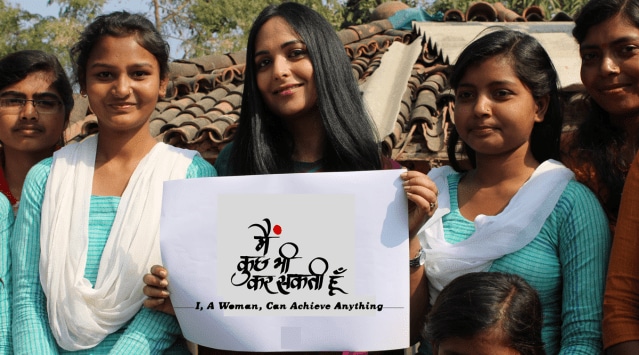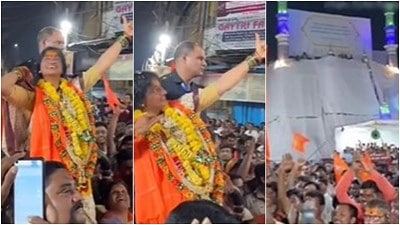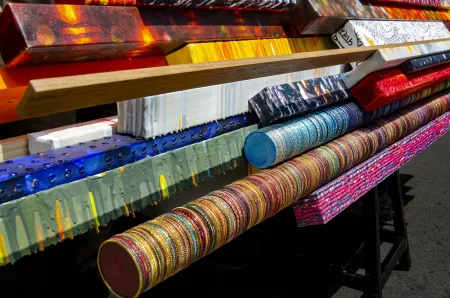- India
- International
In Bihar’s Nawada, girls show how Re 1 a day helped them set up a sanitary pads bank
It’s just a voluntary contribution of one rupee per day, but this initiative is helping young girls speak up about their menstrual needs, and take on other social issues
 (From left) Mausam Kumari, Meinal Vaishnav and Sweety Kumari. (Source: PR Handout)
(From left) Mausam Kumari, Meinal Vaishnav and Sweety Kumari. (Source: PR Handout)Nineteen-year-old Mausam Kumari vividly remembers the time when she and her peer group were first told about menstrual health and hygiene, and the need to use sanitary pads instead of plain cloth, rugs, sand and other such items that are dangerous for health. “We all were embarrassed in the kishori baithak (teen meetings). When the cluster coordinator was explaining to us, we didn’t realise its importance. A few days later, one of our classmates fell sick after using unhygienic cloth, and that’s when we understood the real issue,” the girl, from Hardiya village of Nawada in Bihar, told indianexpress.com.
She and her peer group also took a cue from the edutainment show Main Kuch Bhi Kar Sakti Hoon launched by NGO Population Foundation of India (PFI) to address the prevailing social and cultural norms around family planning, early marriage, early and repeated pregnancies, contraceptive use, domestic violence and sex selection. The show, starring Meinal Vaishnav, “inspired” them to take the agenda forward and educate mothers, families and young girls about the issue. Due to the general hesitation to talk about menstrual hygiene — let alone buy sanitary pads — the group called ‘Nawada Girls’ decided to come together and started collecting Re 1 a day as a voluntary contribution from each girl of the group to buy sanitary pads for themselves and others who may not have the means to purchase them. A rupee collected each day would add up to Rs 30 a month which would be “more than enough” to buy a sanitary pad pack which costs Rs 25.
The girls then set up a sanitary pads bank with the savings in 2016, and later a youth-friendly health clinic called Yuva Clinic for both young men and women to “discuss issues of health and well-being” that troubled them.
“With the help of on-ground partners, there are approximately 300 girls’ groups, in eight blocks across two districts of Nawada and Darbhanga that meet every month, share information, and learn about subjects concerning their health and well-being. Inspired by the lead protagonist of the show, they discuss topics like gender equality, mental and sexual health, hygiene, and nutrition.”
ALSO READ | In 2020, why is menstruation still a taboo? This social activist seeks answers

“Authorities hold a public dialogue twice a year and we expressed our wish of having an adolescent-friendly health clinic so that we can discuss our issues and talk without any fear. Our request was fulfilled and now, all the girls in the village go there and use services available in the clinic,” Mausam explains.
Studies and experts suggest that menstrual health, when neglected, could lead to health issues like reproductive tract infections, Hepatitis B infection, various types of yeast infections and Urinary Tract Infection, to name a few. While menstruation is a normal bodily function that women in the menstruating age undergo each month, the lack of awareness and access to menstrual hygiene products are major issues such that the National Family Health Survey 2015-2016 estimates that of the 336 million menstruating women in India, only about 121 million (roughly 36 per cent) women are using sanitary napkins, locally or commercially-produced.
Now four years later, amid the pandemic, while the sanitary pads bank has helped girls and young women by providing 40-50 pads a month, the Yuva Clinic model has sprouted other similar initiatives being set up across Rajauli, a sub-district of Nawada.
Youth clubs affiliated with Nehru Yuva Kendra #Nawada #Bihar are constantly promoting fitness in rural areas.#NewIndiaFitIndia#Run4India@KirenRijiju | @RijijuOffice | @YASMinistry | @PMOIndia pic.twitter.com/vyYE9wYtwD
— NYKS India (@Nyksindia) October 14, 2020
“The youth champions submitted a charter of demands in September 2019, to the State Health Minister, District Magistrates and Civil Surgeons, which led to the initiation of these adolescent-friendly health clinics. Today, it makes me proud that by the end of October, eight such youth-friendly clinics will have been set up in the two districts (Nawada and Darbhanga). The girls have been relentless in their pursuit of adolescent health and wellness. This is a small-yet-significant step forward towards health system change in Bihar, that includes and then goes far beyond menstrual health issues. The effectiveness and impact of the work we have seen with these girls’ groups has encouraged PFI to continue and expand its work on adolescent health and well-being,” Poonam Muttreja, executive director, PFI tells indianexpress.com.
“The need for menstrual hygiene can’t be understated. I want that all places have a napkin bank and a Yuva Clinic to help raise awareness on issues that are hardly spoken about and almost always in hushed tones,” Mausam remarks. Seconding her, Sweety Kumari, a team member from the group, says poor menstruation knowledge and practices impact their education prospects. “Mothers were first made to understand the need for menstrual hygiene so that they would allow their daughters to take up hygienic practices which otherwise disrupt their school attendance,” she says, adding that “despite lockdowns, they continued to collect money and distribute sanitary napkins”.
A 2014-report by the NGO Dasra titled Spot On! concluded how almost 23 million girls in India drop out of school annually, because of lack of menstrual hygiene management facilities, including the availability of sanitary napkins and awareness about menstruation. The report further suggested that the girls, who don’t drop out, usually miss up to five days of school every month.
These girls’ groups do much more than simply ‘discuss’ issues, they campaign to prevent child marriages; youth leaders participate in the district-level public dialogues while dealing with critical issues like contraceptive options.
The message of self-reliance and empowerment in our program @MKBKSH_ has inspired young girls in Bihar to not just sustain a sanitary pad bank but also conduct dialogues on subjects like contraceptive options.https://t.co/XB7y9aHt1T via: @LogicalIndians #ReelToReal #girlpower
— Poonam Muttreja (@Letstransform) October 13, 2020
Dr Srinath Prashad, ex-civil surgeon-Nawada shares his perspective. “The girls were earlier unable to speak up for themselves. They were unaware of the physical changes happening in their bodies. They didn’t know about sanitary pads, but today they have started a bank of sanitary pads. It is commendable.”
Main Kuch Bhi Kar Sakti Hoon‘s director Feroz Abbas Khan mentions how the show’s “ground research threw light on the need for busting myths without trivialising issues” in an engaging way. Vaishnav, who played the role of Dr Sneha Mathur, a young doctor, who leaves her lucrative career in Mumbai and decides to work in her village in the show, recalls her meeting with the “courageous girls” in January 2020. “Considering the taboo still associated with the subject, it is impressive how the noble effort is being carried out. Even in metropolitan cities like Mumbai, there is hesitation. Such education and awareness is surely the need of the times,” she says.
For more lifestyle news, follow us: Twitter: lifestyle_ie | Facebook: IE Lifestyle | Instagram: ie_lifestyle
More Lifestyle
Apr 18: Latest News
- 01
- 02
- 03
- 04
- 05

























